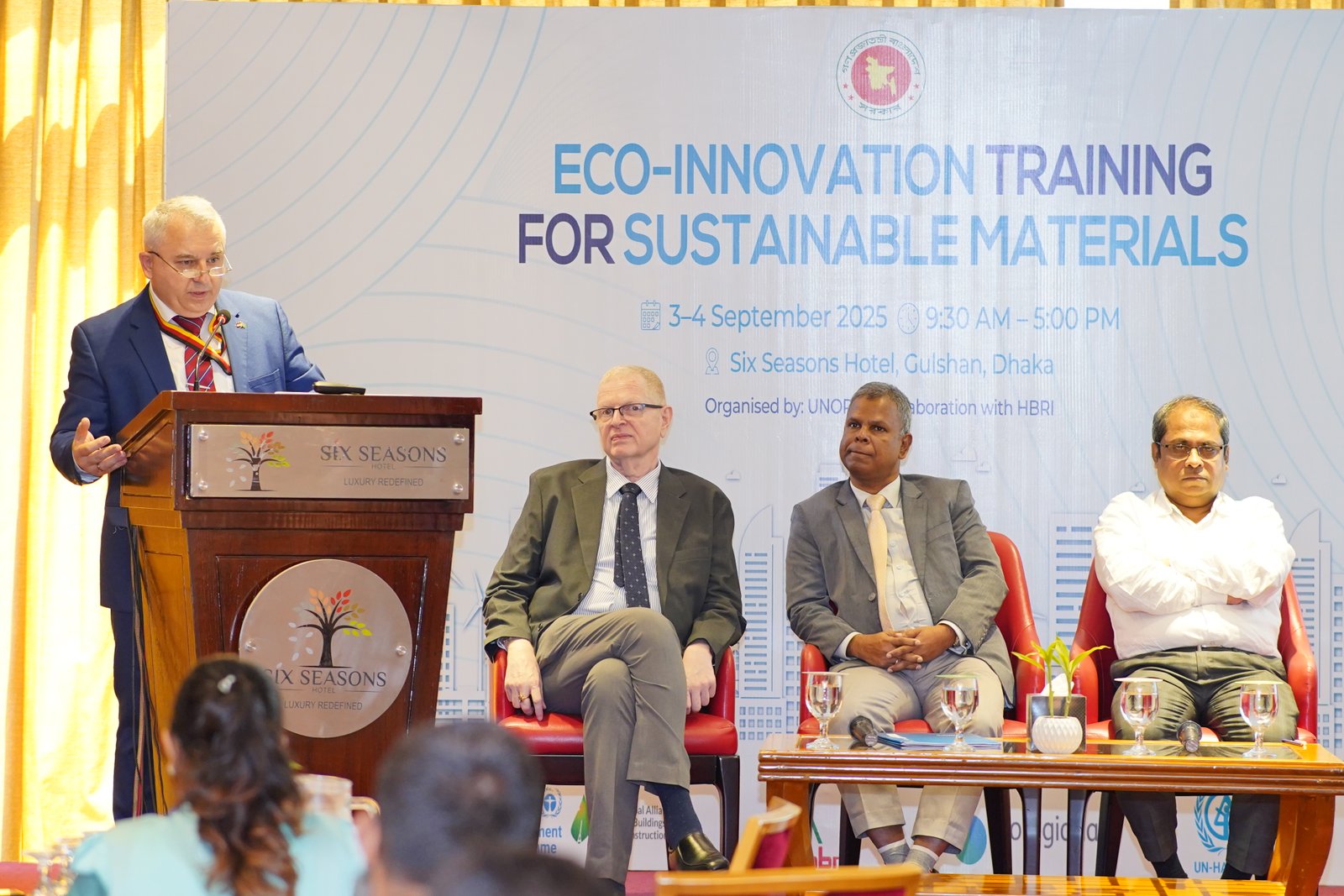Capacity-building for SMEs positions Bangladesh’s construction sector for a low-carbon future

Capacity-building for SMEs positions Bangladesh’s construction sector for a low-carbon future
Experts tell at UNOPS, UNEP, and HBRI training program
Business Desk
Experts at a training session focused on strengthening the capacity of small and medium enterprises (SMEs) to adopt low-carbon practices and drive eco-innovation.
The United Nations Office for Project Services (UNOPS), in collaboration with the United Nations Environment Programme (UNEP), the House Building Research Institute (HBRI), Bangladesh and supported by the Government of Germany through BMZ organised the training program.
The training program, styled ‘Eco-Innovation Training for Sustainable Materials’ took place at a city hotel on 3–4 September.
The training brought together representatives from government, development partners, academia, and the private sector.
Opening the training Md. Abdul Matin, Additional Secretary, Ministry of Housing and Public Works, highlighted the sector’s pivotal role in both economic growth and climate action.
He noted “Our cities are expanding fast, with over two million people moving to urban areas each year. If we continue with business as usual, the costs will be immense. But with innovation, we can harness this demand to build greener and more resilient cities. ”
Reflecting Germany’s strong partnership with Bangladesh, Ulrich Kleppmann, Head of Development Cooperation, Embassy of the Federal Republic of Germany in Dhaka, emphasised that incentives alone are not sufficient;, a strong legal and regulatory framework is equally essential to drive the transition. We fully share this view and remain committed to strengthening our partnership in achieving this goal, with the support of the Government of Bangladesh.”
The initiative is part of the project Transforming the Built Environment through Sustainable Materials, which supports Bangladesh in achieving its Nationally Determined Contributions (NDCs) and Climate Action Roadmap for Buildings and Construction.
The training featured sessions on life-cycle carbon assessment, low-carbon materials, circular business models, and pathways to accessing green finance.
On the second day, participants joined a high-level panel discussion titled “Opportunities and Challenges for SMEs in Obtaining Green Financing to Promote Eco-Innovation and Strengthen Low-Carbon Materials Supply Chain in the Construction Sector in Bangladesh.”
Moderated by Celia Martinez of UNEP, the panel brought together Dr. Ariful Haque of the MoHPW, Professor Mohammad Shariful Islam of BUET, Dr. Dana de la Fontaine of GIZ, and Md. Shabu Munshi of Eastern Bank Limited.
Sudhir Muralidharan, Country Manager for UNOPS Bangladesh and Bhutan, highlighted the transformative role of eco-innovation in shaping the country’s future. “SMEs are central to Bangladesh’s construction supply chain. Eco-innovation equips them with tools to transform business models, embrace circularity, and access green finance. Even partial adoption by SMEs will bring significant benefits in emissions reduction, competitiveness, and resilience. Today’s training is not just a workshop—it is a catalyst for change.”
Bringing the event to a close, Dr. Ariful Haque, Joint Secretary, Ministry of Housing and Public Works, reaffirmed the Ministry’s strong commitment to sustainability. He stated “Sustainability and low-carbon development are now central priorities for the Ministry of Housing and Public Works.”
This training marks a major step toward mainstreaming sustainable construction in Bangladesh.



